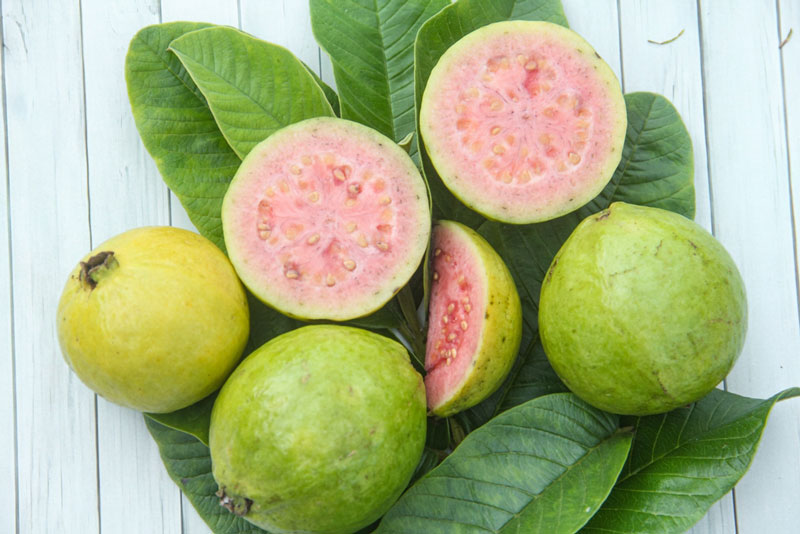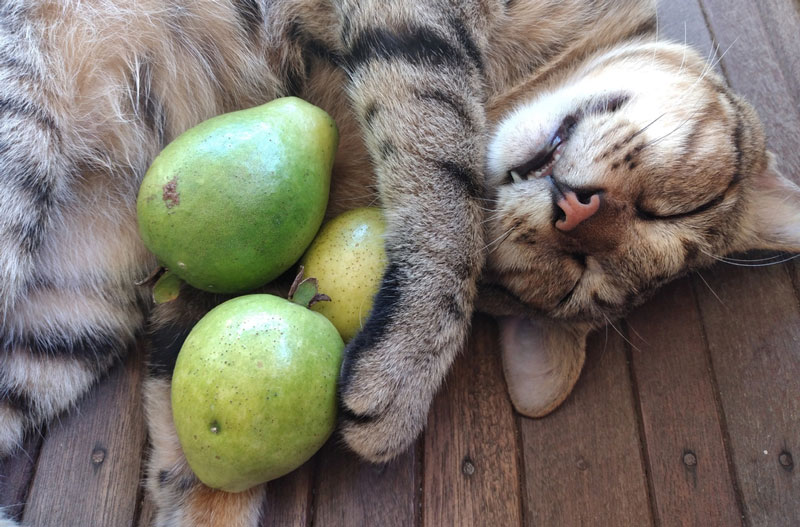Have you ever wondered, can cats eat guava? The answer, surprisingly, is yes! While guava isn’t toxic to our feline friends, there are some important things we need to know before sharing this tasty fruit with them. Just like we need a balanced diet, so do our cats. In this article, we’ll explore the details surrounding guava and its suitability for cats.
Guava is a tropical fruit that brings to mind sunny beaches and tropical vibes! But for our furry companions, it’s essential to ensure that whatever we share with them aligns with their dietary needs. Knowing the ins and outs of guava for cats can help us make safe choices. Cats tend to be picky eaters, and understanding their preferences and tolerances is vital. So, let’s find out more about this intriguing fruit and how it fits into our pets’ lives.
Keep reading as we take you through the details of whether our cat pals can munch on guava, how much is good, the benefits, the risks, and some substitute options. By the time we finish, you’ll be armed with all the information you need! Let’s jump in!
You might also be interested in: Can Cats Eat Mango?
Can Cats Eat Guava?

When we think of guava, we often picture a sweet, juicy fruit that’s packed with flavor. This tropical delight is usually enjoyed by many humans, and it can even be a source of vitamins and nutrients. So, can our feline companions enjoy this treat too? The good news is that guava is generally safe for cats to eat in moderation. Cats are obligate carnivores, which means their primary dietary requirement is meat. This begs the question—should we even consider sharing fruits with them?
Guava is rich in Vitamin C, fiber, and antioxidants, making it a nutritious choice for humans. While cats do not require Vitamin C in their diet as we do, they might enjoy the taste if offered a small slice. Giving them small pieces can be an exciting treat, but we need to be cautious to monitor their reactions. Some cats may enjoy guava, while others might turn their noses up at it. It’s always essential to know our cats and what makes them happy.
How Much Guava Can Cats Eat?
Now that we know cats can eat guava, the next question is, how much is safe for them? Moderation is key, as it is with many things in life. Since cats mainly derive their energy from meat, fruits like guava should be treated as an occasional treat rather than a dietary staple. A small piece a couple of times a week should be sufficient for most cats, but this might depend on the individual cat and their unique tastes.
When introducing guava to our cats, we should start with a very small amount. This helps us gauge whether or not they like the taste and if they’ll experience any unpleasant reactions. Cutting a small slice or two, without the skin, would be a good starting point. If your cat enjoys it and seems to tolerate it well, we can continue to offer it from time to time.
It’s also essential to observe our cats after they’ve tried something new. Just like humans can have food sensitivities, our feline pals can also have varying reactions to different foods. If we notice any signs of discomfort, like vomiting or diarrhea, after they eat guava, then it’s best to refrain from offering it again in the future.
This mindful approach helps us take better care of our furry friends and ensure they stay healthy while enjoying the occasional taste of something new. Finally, remember to always provide fresh water alongside any treats, and keep guava portions minimal to maintain a balanced diet.
Benefits Of Guava To Cats
1. Vitamin C: One of the primary benefits of guava is that it contains high amounts of Vitamin C. While cats produce their own Vitamin C naturally, a little extra from guava can be beneficial for their overall health. It can contribute to maintaining a strong immune system and may help in reducing inflammation.
2. Antioxidants: Guava is also rich in antioxidants. Antioxidants help protect our bodies from harmful free radicals, which can lead to various diseases. While our cats may not need the same antioxidant boost as we do, introducing small amounts of certain fruits can still offer some health advantages and keep their bodies functioning well.
3. Support Digestive Health: The fiber in guava can support digestive health. Although cats are most likely to get their necessary fiber from their regular food, an occasional piece of guava can add variety to their diet. This might even assist with regulating bowel movements, preventing constipation, which can be an issue for some cats.
4. Bonding Experience: Sharing guava as a treat can also be a bonding experience. Feeding our cats small treats helps strengthen our connection with them, and cats love to explore new textures and flavors. Guava can offer them a fun alternative to their everyday kibble and encourage them to try something less conventional.
5. Stimulate Cat’s Curiosity: Lastly, introducing guava can stimulate your cat’s curiosity and playful nature. Cats love exploring new things, and sometimes a new taste can be a fun way to inspire playfulness and keep them mentally engaged. A little guava might just serve as a delightful surprise that brightens their day!
Dangers Of Feeding Guava To Cats
Though guava has its benefits, we can’t ignore the possible risks and dangers associated with feeding it to our feline friends. First of all, while guava isn’t toxic, cats have unique digestive systems that aren’t designed for processing fruits like humans are. This could lead to stomach upset in some cases if they eat too much or if they are not accustomed to fruits.
One of the major risks is the potential for choking. As with any food, small pieces can pose a choking hazard, particularly for cats that tend to gulp down their meals without chewing. So, it’s crucial to prepare the guava properly, making sure it’s cut into small, manageable pieces that are easy for them to handle.
Another risk is that guava, like many fruits, can be high in sugar. While natural sugars found in fruit are not harmful in small amounts, too much sugar can contribute to obesity in cats. Feline obesity is linked to a slew of health problems, including diabetes and joint issues, which can greatly affect a cat’s quality of life.
Certain cats may also have specific food intolerances or allergies that could be triggered by adding new food to their diet. If we notice any unusual behavior or signs of distress after introducing guava, it’s always best to consult with a veterinarian.
Finally, the seeds found in guava can also be a potential risk. While many cats might just eat the flesh and leave the seeds behind, they can pose a choking hazard or may cause intestinal discomfort. If we do decide to share guava, it’s wise to remove any seeds entirely to minimize risk. Just as with everything in life, it’s all about balance and caution.
Substitute Of Guava For Cats
1. Watermelon: If guava doesn’t seem like the best fit for our cats, there are countless substitutions that we can explore. One popular choice is watermelon! Watermelon is hydrating and contains mostly water, making it a great snack during hot days. Cats can enjoy small bites without any worry about high sugar content.
2. Pumpkin: Another excellent substitute is cooked pumpkin. Pumpkin is high in fiber and can help with digestive issues. Many cats enjoy the taste of plain, canned pumpkin, and it’s beneficial for maintaining regular bowel movements.
3. Blueberries: These are another tasty option! These little gems are also packed with antioxidants. Blueberries can serve as a fun, bite-sized treat for our cats while providing health benefits, like supporting their immune systems.
4. Bananas: If you want to remain on the safe side of fruits, bananas can be a popular choice as well. They are low in calories and high in potassium, making them a nutritious option for our pets. A small slice or two of banana can be enough to make their day.
5. Sweet Potatoes: Lastly, we could consider giving our cats some cooked sweet potatoes! Sweet potatoes are not only delicious for humans, but they’re packed with nutrients that can support healthy digestion. Just remember to serve cooked and mashed sweet potatoes in moderation!
Can Cats Eat Guava? Frequently Asked Questions
Can Guava Be Toxic To Cats?
No, guava is not toxic to cats, but moderation is always advisable when giving them any human food.
What Should I Do If My Cat Has a Negative Reaction To Guava?
If your cat shows signs of discomfort, such as vomiting or diarrhea, after eating guava, it’s best to stop giving it to them and consult your veterinarian.
Can Cats Eat Guava Seeds?
No, guava seeds should be removed before offering any fruit to your cat, as they can pose a choking hazard.
Is It Okay To Give My Cat Guava Juice?
Guava juice may contain added sugars or preservatives, which could upset your cat’s stomach. It’s best to stick to fresh fruit in moderation.
What Fruits Are Completely Safe For Cats?
Some fruits that are generally safe for cats include watermelon, blueberries, and bananas, served in small amounts. Always consult a vet if unsure!
Final Thoughts
Overall, guava can be a delightful and safe treat for our cats if given in moderation. While it’s not an essential part of their diet, sharing a small slice can bring both joy and some potential health benefits to our feline family members. Just keep an eye on their reactions, and always remove any seeds beforehand.
As pet lovers, we want the best for our furry friends. It’s our responsibility to learn about new foods before offering them, and exploring new treats can be a wonderful bonding experience. If guava isn’t the right fit, don’t hesitate to offer other fruits or healthy substitutes instead. Remember, everything in moderation!
Curious about more pet-related topics? Feel free to explore more about what our furry friends can and can’t eat on our blog! From chocolate hazards to dog-friendly fruits, there’s plenty more to learn. Check out Can Cats Eat Lettuce? or learn if they can enjoy carrots.


